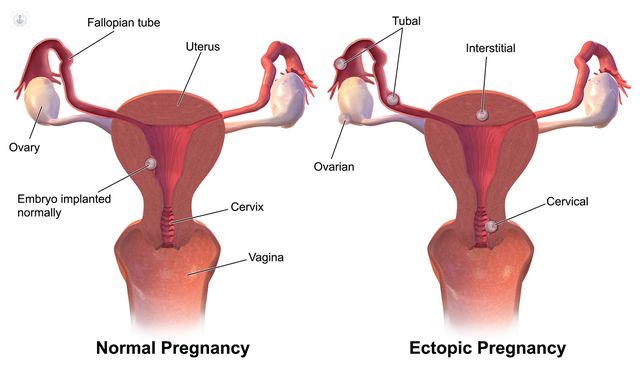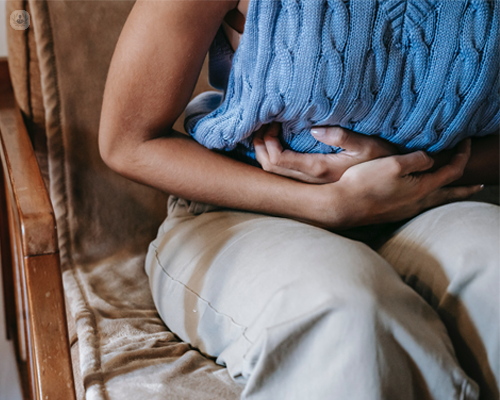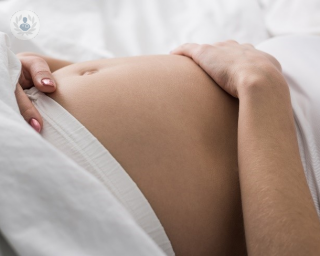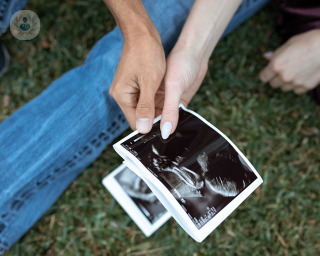Ectopic pregnancy
Dr Shahla Ahmed - Obstetrics & gynaecology
Created on: 04-25-2014
Updated on: 12-05-2023
Edited by: Kate Forristal
What is an ectopic pregnancy?
In a normal pregnancy, the fertilised egg attaches itself to the lining of the uterus. Ectopic pregnancy involves the fertilised egg implanting and growing outside the uterus, in places such as:
- the fallopian tube
- the ovary
- the cervix
- the abdominal cavity

How common is ectopic pregnancy?
1 in 90 pregnancies are ectopic in the UK, amounting to about 11,000 annually.
Does an ectopic pregnancy show up on a pregnancy test?
The hormone human chorionic gonadotropin (hCG), which is produced by the placenta during a pregnancy, is what determines a pregnancy test; if the hormone is present, the test is positive. The hormone hCG is produced during an ectopic pregnancy, so the test will be positive.
What are the symptoms of an ectopic pregnancy?
An ectopic pregnancy, along with the usual symptoms associated with pregnancy, can cause:
- vaginal bleeding
- pain when going to the toilet
- pain on one side of your abdomen
- pain in your shoulder
These symptoms tend to develop anywhere between the 4th and 12th week. These symptoms can also be caused by another condition, like tummy bug.
How is an ectopic pregnancy diagnosed?
Not all people with ectopic pregnancy experience symptoms and it might only be diagnosed during a routine pregnancy scan.
If you are experiencing symptoms, after an assessment of your symptoms, the doctor will order some blood tests and a vaginal ultrasound. The blood test can help not only with diagnosis but with treatment, as you may need a blood transfusion.
In some cases, a form of keyhole surgery called a laparoscopy might be recommended if it’s still difficult to make a diagnosis. If an ectopic pregnancy is found, the fertilised egg can be removed during the same procedure.
What causes an ectopic pregnancy?
The following can increase your chances of an ectopic pregnancy:
- sexually transmitted infections
- scarring from pelvic surgery
- infertility treatment such as IVF
- pelvic inflammatory disease
- smoking
You’re also more likely to experience an ectopic pregnancy if you are between the ages of 35 and 40.
Tubal pregnancy, where the egg attaches itself to the lining of the fallopian tube, is caused by a blockage that stops the egg travelling to the uterus. This may be the result of fallopian tube surgery or damage due to inflammation.

Can an ectopic pregnancy be prevented?
Preventing an ectopic pregnancy is impossible. You can, however, reduce your risk of ectopic pregnancy by stopping smoking and reducing your chances of STIs.
How is an ectopic pregnancy treated?
Treatment for ectopic pregnancy depends on how early it has been detected.
If the diagnosis was made early and you don’t have unstable bleeding, ectopic pregnancy can be treated with an injection of methotrexate, a strong medicine which should dissolve any existing cells. You’ll be monitored with follow-up blood tests and you may need to continue taking contraceptive medication for the next few months.
If medication doesn’t work, or if the pregnancy is more advanced, surgery is generally recommended. A laparoscopy is performed under general anaesthetic and involves inserting small surgical tools to remove the ectopic pregnancy. If your fallopian tube is damaged and the other one is healthy, the surgeon might also remove the damaged fallopian tube.
After treatment you might have a follow-up appointment with a fertility specialist to discuss your chances of getting pregnant and get advice on when to start trying again.
What complications can arise from an ectopic pregnancy?
If the pregnancy occurs in one of the fallopian tubes, which accounts for over 90% of ectopic pregnancies, there is a risk that as the pregnancy progresses, it will grow so much it will cause the fallopian tube to rupture and cause life-threatening internal bleeding, which needs to be treated immediately.
Can a baby survive during an ectopic pregnancy?
Unfortunately, the fertilised egg cannot survive in an ectopic pregnancy and will miscarry.
What support is available following an ectopic pregnancy?
Following a lost pregnancy, it is normal to experience grief, which can last for an extended period of time. Support groups help those who are struggling following an ectopic pregnancy. Additionally, counselling can be beneficial.
Does an ectopic pregnancy mean you can’t get pregnant?
It is possible to have a successful pregnancy if you have experienced an ectopic pregnancy or had a fallopian tube removed. About 65% of women will have a normally pregnancy in 18 months following an ectopic pregnancy. While there is a slightly higher-risk of experiencing another ectopic pregnancy, it is still small, at about 10%. It’s helpful to speak to your GP to arrange early scans to ensure the pregnancy is developing normally. IVF can help those who are struggling to achieve a normal pregnancy.
How long should you wait following an ectopic pregnancy before trying again?
If you wish to try for another baby, it’s advisable to wait at until you have had at least two periods, but those who have received methotrexate should wait three months to ensure no traces remain which could be harmful for the baby.















